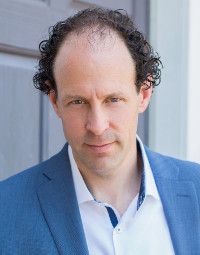2018 School Spending Survey Report
Q&A: Brad Parks, Winner of the Shamus, Nero, and Lefty Awards
With the March release of Closer Than You Know (starred review, LJ 10/1/17), Parks continues to delve into the darker aspects of suburban life. Here he shares his inspiration for the new book and writing background.

Photo by Sara Harris
Brad Parks is the only author to have won the Shamus, Nero, and Lefty Awards, three of crime fiction’s top literary prizes. His previous novel, Say Nothing, was named one of LJ’s five Best Thrillers of 2017. With the March release of Closer Than You Know (starred review, LJ 10/1/17), Parks continues to delve into the darker aspects of suburban life. Here he shares his inspiration for the new book and writing background. Do you have any plans to bring back your series character, news reporter Carter Ross? Someday, yes. Carter is a big part of me. (Or I’m a big part of Carter—frankly, it gets a little difficult to untangle). But at least for the time being, I’ve been enjoying the freedom of writing stand-alones. And, for whatever reason, the stories I’ve been drawn to these past few years haven’t been the kind that have a place for Carter. So he’s on the shelf for the moment. But don’t worry. I won’t let him get too dusty. Why do you think readers are so enamored with domestic thrillers? Don’t get me wrong, I love reading stories in which the protagonist can break someone’s jaw by looking at it, or wrestle sharks while free diving 300 feet down, or write an algorithm that will fold your socks for you—or, preferably, all three. I just don’t bump into a lot of folks like that at the grocery store. So I tend not to relate to characters like that; and if I can’t relate to them, I don’t write them very well. I enjoy taking people whose native abilities are about on par with mine—which is to say: not very impressive—and putting them in challenging situations. And I think readers enjoy that, too. Done right, it puts them in the middle of the story, constantly asking what they’d do if this happened to them. Which comes first for you, the beginning or the ending? Neither. For me, it’s: What problem is my character facing? Then I figure out an exciting place to have that confrontation begin. Then—at some point much, much later—I figure out the ending. It’s the last part that’s the most terrifying, because I’m usually about 80 percent of the way through the first draft and still coming home to my wife saying things like, “I have no idea how I’m going to get them out of this mess.” My hope is that the reader is having the same feeling. What’s next for you? Another stand-alone, tentatively titled The Last Act. It’s the story of an out-of-work actor who is hired by the FBI to go to federal prison, impersonate an inmate, and befriend a former bank executive who is harboring documents that could bring down a Mexican drug cartel. (I just finished the first draft. And, no, I had no idea how that one was going to end for a long time, either).
Do you have any plans to bring back your series character, news reporter Carter Ross? Someday, yes. Carter is a big part of me. (Or I’m a big part of Carter—frankly, it gets a little difficult to untangle). But at least for the time being, I’ve been enjoying the freedom of writing stand-alones. And, for whatever reason, the stories I’ve been drawn to these past few years haven’t been the kind that have a place for Carter. So he’s on the shelf for the moment. But don’t worry. I won’t let him get too dusty. Why do you think readers are so enamored with domestic thrillers? Don’t get me wrong, I love reading stories in which the protagonist can break someone’s jaw by looking at it, or wrestle sharks while free diving 300 feet down, or write an algorithm that will fold your socks for you—or, preferably, all three. I just don’t bump into a lot of folks like that at the grocery store. So I tend not to relate to characters like that; and if I can’t relate to them, I don’t write them very well. I enjoy taking people whose native abilities are about on par with mine—which is to say: not very impressive—and putting them in challenging situations. And I think readers enjoy that, too. Done right, it puts them in the middle of the story, constantly asking what they’d do if this happened to them. Which comes first for you, the beginning or the ending? Neither. For me, it’s: What problem is my character facing? Then I figure out an exciting place to have that confrontation begin. Then—at some point much, much later—I figure out the ending. It’s the last part that’s the most terrifying, because I’m usually about 80 percent of the way through the first draft and still coming home to my wife saying things like, “I have no idea how I’m going to get them out of this mess.” My hope is that the reader is having the same feeling. What’s next for you? Another stand-alone, tentatively titled The Last Act. It’s the story of an out-of-work actor who is hired by the FBI to go to federal prison, impersonate an inmate, and befriend a former bank executive who is harboring documents that could bring down a Mexican drug cartel. (I just finished the first draft. And, no, I had no idea how that one was going to end for a long time, either). RELATED
RECOMMENDED
TECHNOLOGY
ALREADY A SUBSCRIBER? LOG IN
We are currently offering this content for free. Sign up now to activate your personal profile, where you can save articles for future viewing









Add Comment :-
Comment Policy:
Comment should not be empty !!!